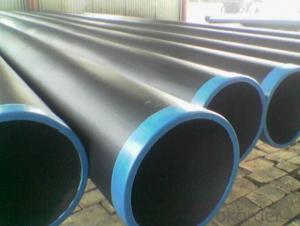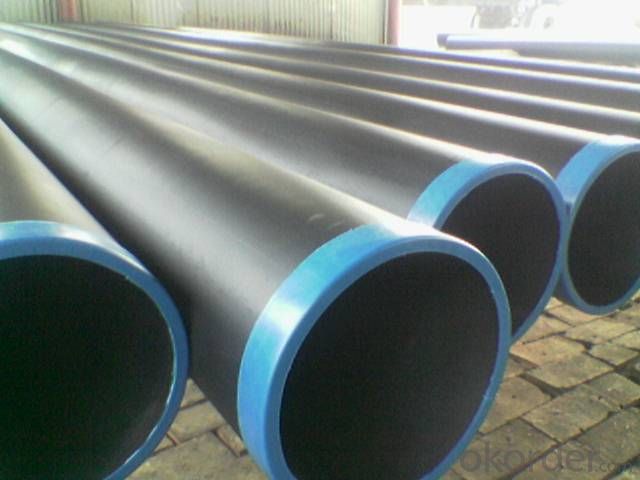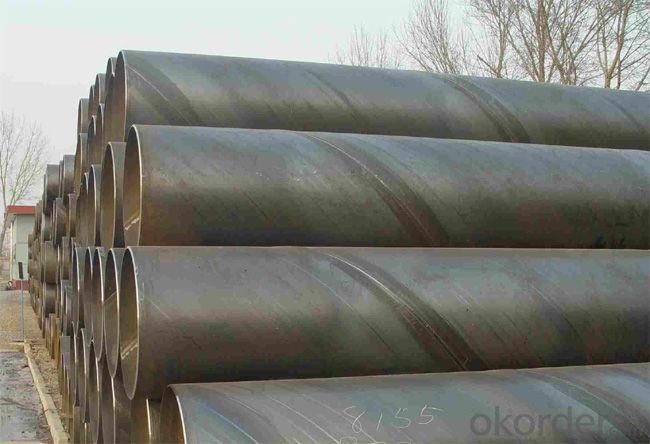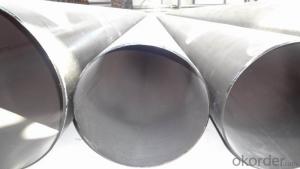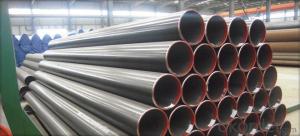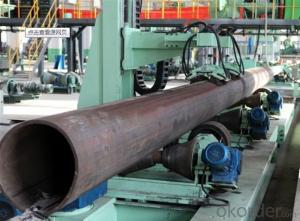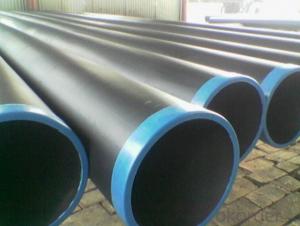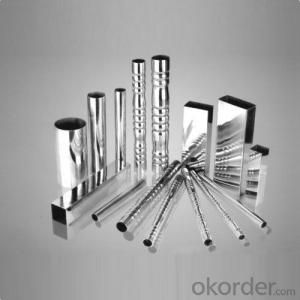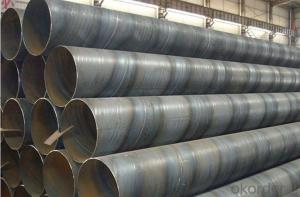X70 LSAW STEEL PIPE
- Loading Port:
- China Main Port
- Payment Terms:
- TT or LC
- Min Order Qty:
- -
- Supply Capability:
- -
OKorder Service Pledge
OKorder Financial Service
You Might Also Like
Product Description:
1、Structure of Welded Steel Tube:
Welded Steel Tube is formed by drawing a solid billet over a piercing rod to create the hollow shell. We are company that have many years experience and professional manager team and engineer team and sales team, sure we will provide you high quality of welded pipe and professioanl service.
2、Main Features of the Welded Steel Tube:
• High manufacturing accuracy
• The higher strength
• The small inertia resistance
• Strong heat dissipation ability
• Good visual effect
• Satisfy price
3、Welded Steel Tube Specification:
Standard | GB, DIN, ASTM ASTM A106-2006, ASTM A53-2007 |
Grade | 10#-45#, 16Mn 10#, 20#, 45#, 16Mn |
Thickness | 8 - 33 mm |
Section Shape | Round |
Outer Diameter | 133 - 219 mm |
Place of Origin | Shandong, China (Mainland) |
Secondary Or Not | Non-secondary |
Application | Hydraulic Pipe |
Technique | Cold Drawn |
Certification | API |
Surface Treatment | factory state or painted black |
Special Pipe | API Pipe |
Alloy Or Not | Non-alloy |
Length | 5-12M |
Outer Diameter | 21.3-610mm |
Grade | 20#, 45#, Q345, API J55, API K55, API L80, API N80, API P110, A53B |
Standard | ASME, ASTM |
1) Material:20#(ASTM A 106/A53 GRB.API5LGRB,GB),45#,16Mn,10#.
2) Specification range:OD:21.3-610mm,WT:6-70mm,length:6-12m or according to the requirement of clients.
3) Excutive standards:GB,ASME API5L.ASTM A 106/A53,Despite of the above standards,we can also supply seamless steel pipe with standard of DIN,JIS,and so on,and also develop new products according to the requirements of our clients!
4) Surface:black lacquered,varnish coating or galvanized.
5) Ends:Beveled or square cut,plastic capped,painted.
6) Packing:bundles wrapped with strong steel strip,seaworthy packing.
4、Packaging & Delivery
Packaging Details: | seaworthy package,bundles wrapped with strong steel strip |
Delivery Detail: | 15-30days after received 30%TT |
5、FAQ of Welded Steel Tube:
①How is the quality of your products?
We have many years business experience in this area, and we have professional engineer and manager team and sure we can provide you high quality production and professional service.
②How about price?
Yes, we are factory and be able to give you lowest price below market one, and we have a policy that “ for saving time and absolutely honest business attitude, we quote as lowest as possible for any customer, and discount can be given according to quantity”. trust the quotation we would give you, it is professional one.
③Why should you chose us?
We can give you both.Additionally, we can also offer professional products inquiry, products knowledge train(for agents), smooth goods delivery, exellent customer solution proposals.Our service formula: good quality+good price+good service=customer’s trust
SGS test is available, customer inspection before shipping is welcome, third party inspection is no problem.
6、 Welded Steel Tube Images:
- Q: What are the standard dimensions for steel pipes?
- The standard dimensions for steel pipes vary depending on the application and industry. However, common sizes range from ½ inch to 48 inches in diameter and have various wall thicknesses based on the required strength and pressure rating.
- Q: How are steel pipes used in the manufacturing sector?
- Steel pipes are commonly used in the manufacturing sector for various purposes, such as transporting fluids and gases, providing structural support, and facilitating the flow of materials in manufacturing processes. They are used in industries like construction, oil and gas, automotive, and aerospace for applications such as pipelines, machinery, conveyors, and infrastructure. Steel pipes offer durability, strength, and resistance to corrosion, making them an ideal choice for many manufacturing needs.
- Q: What is hot rolled steel pipe? What is a cold drawn steel tube?
- Seamless steel pipe, hot-rolled and cold-rolled (DIAL) seamless steel pipe two categories.Hot rolled steel tubes are divided into ordinary steel tubes, low and medium pressure boiler tubes, high pressure boiler tubes, alloy steel pipes, stainless steel pipes, oil cracking pipes, geological steel pipes and other steel pipes, etc..Cold rolled seamless steel pipe (DIAL) in general, steel pipe for low and medium pressure boiler tube, high-pressure boiler steel pipe, alloy steel pipe, stainless steel pipe, oil cracking tube and other steel tube, including carbon thin-walled steel, alloy thin-walled steel, stainless steel, thin steel tube. The outer diameter of hot-rolled seamless tube is generally greater than 32mm, the wall thickness is 2.5-75mm. The outer diameter of cold-rolled seamless steel tube can reach 6mm, the wall thickness can be up to 0.25mm, the outer diameter of thin-wall pipe can be 5mm, the wall thickness is less than 0.25mm, and cold rolling has higher precision than hot rolling dimension.
- Q: Can steel pipes be used for underground sewerage systems?
- Indeed, underground sewerage systems can make use of steel pipes. These pipes possess remarkable strength and durability, rendering them suitable for the transportation of sewage beneath the surface. Their resistance to corrosion is high, allowing them to withstand the pressure and weight of the soil above. Moreover, steel pipes boast an extended lifespan and exhibit resilience against environmental factors like moisture, chemicals, and temperature variations. Furthermore, the ease of welding steel pipes makes the process of installation and repairs more convenient. Nevertheless, it is crucial to ensure that these steel pipes are adequately coated or lined to prevent corrosion and comply with local regulations and standards pertaining to underground sewerage systems.
- Q: How are steel pipes used in LNG terminals?
- Steel pipes are used in LNG terminals to transport liquefied natural gas from storage tanks to processing facilities or to ships for export. These pipes are highly durable and can withstand the extreme cold temperatures of LNG, ensuring safe and efficient transportation of this valuable energy resource.
- Q: How are steel pipes measured?
- Steel pipes are typically measured by their outer diameter (OD) and wall thickness. The OD is measured using a caliper or tape measure, while the wall thickness is determined using specialized tools like ultrasonic gauges or micrometers. These measurements are crucial for determining the pipe's size, strength, and suitability for various applications.
- Q: How are steel pipes used in sewage treatment plants?
- Steel pipes are used in sewage treatment plants to transport and distribute wastewater throughout the facility. They are crucial in carrying raw sewage from the intake point to various treatment processes such as sedimentation tanks, filtration units, and aerobic/anaerobic digesters. Additionally, steel pipes may be utilized for pumping treated or partially treated wastewater to outfall locations or for reuse purposes. The durability and corrosion resistance of steel make it an ideal choice for handling the harsh and corrosive nature of sewage, ensuring long-lasting and efficient operation of the treatment plant.
- Q: What does "DN25 PN16" mean?
- The welded steel pipe can be divided into thin-wall steel tube, ordinary steel pipe and thickened steel tube according to the thickness. Its nominal diameter is neither external diameter nor internal diameter, but a nominal size similar to the diameter of the ordinary steel pipe. Each nominal diameter corresponds to an outer diameter, and the inner diameter varies with the thickness. Nominal diameter can be expressed in metric mm, also available in English in. With nominal diameter pipeline accessories, meaning with tube. "DN25" means the inner diameter of the steel pipe is 25MM.
- Q: What are the different methods of inspecting steel pipes?
- There are several methods of inspecting steel pipes, including visual inspection, ultrasonic testing, magnetic particle testing, dye penetrant testing, radiographic testing, and eddy current testing.
- Q: What is the difference between internal threading and external threading of steel pipes?
- The difference between internal threading and external threading of steel pipes lies in the location and method of threading. Internal threading refers to the process of creating threads on the inside surface of a steel pipe, allowing it to be connected to other components with external threads. On the other hand, external threading involves creating threads on the outside surface of a steel pipe, enabling it to be joined with components having internal threads. These two methods serve different purposes and are utilized depending on the specific requirements of the plumbing or assembly project.
Send your message to us
X70 LSAW STEEL PIPE
- Loading Port:
- China Main Port
- Payment Terms:
- TT or LC
- Min Order Qty:
- -
- Supply Capability:
- -
OKorder Service Pledge
OKorder Financial Service
Similar products
Hot products
Hot Searches
Related keywords
